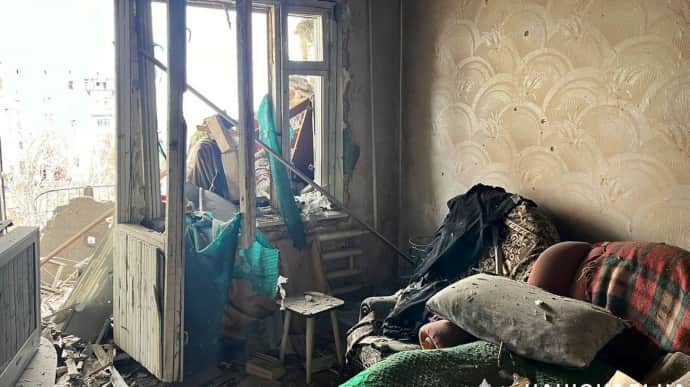Daily Flyer - March 19, 2024
A voice of Ukraine to the West

Russian frozen assets: Borrell will offer to allocate 90% of revenues to weapons for Ukraine
Josep Borrell, EU High Representative for Foreign Affairs and Security Policy, said on Tuesday that he will offer the EU to use 90% of the revenues from Russian frozen assets in Europe to purchase weapons for Ukraine through the European Peace Facility.
Source: Josep Borrell, as quoted by Reuters; European Pravda
The EU's top diplomat told reporters in Brussels that he would propose transferring the remaining 10% to the EU budget so that they could be used to strengthen the potential of the Ukrainian defence industry.
Borrell said he would submit the proposal to EU member states on Wednesday, ahead of the EU leaders' summit on Thursday and Friday.
Last week, a senior EU official said Russian assets frozen in the European Union could generate anywhere from 15 billion to 20 billion euros in after-tax profits by 2027, depending on global interest rates.
About 70% of all Russian assets immobilised in the West are held in the Belgian Central Securities Depository Euroclear, which has the equivalent of €190 billion in various securities and cash of the Russian central bank.
Borrell stressed that the proposal is to use profits from assets held in Europe, not the assets themselves. According to Borrell, this can bring about €3 billion annually.
"The concrete proposal will be tabled tomorrow. This is for member states to agree," Borrell said.
Lloyd Austin promised at Ramstein meeting that US and other allies will not allow Ukraine to fail
US Secretary of Defense Lloyd Austin, speaking at the Ramstein meeting on Tuesday, reaffirmed the United States' commitment to supporting Ukraine's military efforts against Russia, despite ongoing obstacles in securing funding from the US Congress.
Austin acknowledged the significant toll that Russia has paid for its aggression, citing estimates of over 315,000 Russian soldiers killed or wounded and a financial cost of up to US$211 billion for the war.
He emphasized the challenges faced by Ukrainian troops and civilians, including harsh conditions and relentless attacks from Russian missiles and Iranian drones. Despite these challenges, Austin asserted that Ukraine remains steadfast, and so does the United States.
"The United States will not let Ukraine fail. This coalition will not let Ukraine fail. And the free world will not let Ukraine fail," Austin affirmed.
Austin highlighted recent efforts by the United States to support Ukraine, including the announcement of an additional US$300 million in security assistance. He described this measure as "extraordinary" and emphasized its importance in addressing urgent needs for air defense, artillery, and anti-tank capabilities.
"We remain determined to provide Ukraine with the resources it needs to counter Kremlin aggression," Austin stated, underscoring the ongoing commitment of the United States to supporting Ukraine in its defense against Russian aggression.
Putin wants to use "record election victory" to prolong war in Ukraine
According to experts from the Institute for the Study of War (ISW), Russian President Vladimir Putin appears to be leveraging his claimed "record victory" in the recent presidential "elections" as a pretext for prolonging the war in Ukraine.
Putin and other senior Russian officials have portrayed the high voter turnout and overwhelming public support for Putin as indicators of Russia's unity and confidence in his leadership.
The Russian Central Election Commission (CEC) announced Putin's victory with 87.28% of the vote, accompanied by a reported record voter turnout of 77.44%. This contrasts with the 2018 presidential election, where Putin won with 76.67% of the vote and a lower turnout of 67.47%.
The commission also reported exceptionally high support for Putin in the occupied territories of Ukraine, including Luhansk, Donetsk, Zaporizhzhia, Kherson oblasts, and Crimea, with Putin purportedly receiving between 88.12% and 95.23% of the vote.
ISW experts suggest that these results are likely falsified, particularly in the occupied regions of Ukraine, where coercion and manipulation were probably used to inflate support for Putin. This coercion could involve forcing Ukrainian citizens to participate in the "elections" under the presence of Russian troops.
Furthermore, experts believe that Putin may exploit these election results to justify the ongoing occupation of Ukrainian territories. By framing the occupation as necessary for "protecting" civilians, Putin could create a narrative to prolong the conflict under the guise of humanitarian intervention.
Overall, ISW analysts caution that Putin's apparent efforts to establish favorable information conditions could contribute to perpetuating the conflict in Ukraine and maintaining Russia's occupation of Ukrainian territories.
Russian attack on Kherson Oblast injures civilian and 3 police officers

According to a statement from Kherson Oblast's police posted on Facebook, Russian forces targeted civilian infrastructure in the Beryslav and Kherson districts, resulting in injuries and damage. The attacks reportedly involved artillery, mortars, tanks, aircraft, and unmanned aerial vehicles (UAVs).
As a result of these strikes, four individuals were injured, including three police officers. Additionally, residential buildings, cars, petrol stations, and a car service station suffered damage due to the attacks.
The statement highlights the indiscriminate nature of the Russian strikes, which have targeted civilian infrastructure and resulted in casualties among civilians and law enforcement personnel alike.

